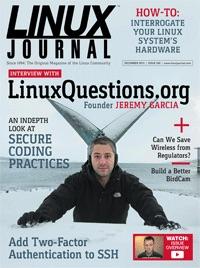December 2015 Issue of Linux Journal


You've Got Questions? We've Got Jeremy Garcia!
Anyone who's active in the Linux community knows that while we love open source and we swear by the kernel, the real power of Linux is the people making up the community. Whether it's folks using Linux in a server room, people contributing code or documentation to a project in their spare time, or even geeks putting Linux stickers on their laptops, Linux is about people. This month, Brian Conner has a great interview with Jeremy Garcia, the founder of LinuxQuestions.org. If there's a better example of a healthy and interactive Linux community, you'll be hard pressed to find it. If you want to know the history of LinuxQuestions, find out more about the man behind it, or even what the future holds, you should check out the interview. Jeremy is as cool as you'd expect him to be!
We also have our regular gang of columnists, starting with Dave Taylor, who teaches us how to do his taxes. More specifically, he shows us how to analyze CSV files from the command line. Proprietary file formats are frustrating to work with, but thanks to the simplicity and standard-ness of CSV, Dave proves it can be an awesome format for folks who like their calculating to be done in a script.
Kyle Rankin delves back into the world of green text on a black background (I'm assuming there, but I have no doubt I'm correct) when he demonstrates how to set up two-factor authentication for SSH connections. In the past, he's described how to set up SSH keys with passphrases to increase security, but it's also possible to create true two-factor auth using Google Authentication. If you want to make your server more secure than passwords alone can manage, you won't want to miss his column.
I actually head back to my backyard this month and discuss some of the upgrades and changes to BirdCam. You might remember my articles outlining how I created a pseudo-streaming Webcam experience pointing at the bird feeders outside my office window. Since we recently moved, I took the opportunity to make some changes, and they were interesting enough that I thought I might share with the class. Whether you have a BirdCam, BabyCam or just use the code to improve your own weekend project, this column should teach some new tricks.
We also introduce a new columnist this month, and she's already a perfect fit in our Linux Journal family. You may remember her Guest EOF column from a year or so ago called "Girls and Software". In this issue, Susan Sons walks through the process to make sure you're using only trusted code when you install packages and dependencies. Distributions generally use cryptographically signed packages for their standard programs, but developers and/or package maintainers need to be diligent in order to avoid compromising security when offering custom applications. If that sounds confusing, be sure to read the first installment of Susan's, Under the Sink column. Welcome to the family, Susan!
Federico Kereki is back this month as well, this time showing how to pry as much information out of your Linux system as possible. When it comes to hardware, Linux supports just about everything under the sun. Thanks to a handful of tools, you can learn about the specific hardware on your system and use that information to troubleshoot those rare occasions when things don't work as planned.
This is a fun issue of Linux Journal, with a big focus on who we are as a community. We include all the bits and pieces you expect from an issue of Linux Journal, and if you're interested in being an active part of the Linux community, you couldn't pick a better issue to read. We hope you enjoy the December 2015 issue of Linux Journal as much as we've enjoyed putting it together!
Available to Subscribers: December 1










